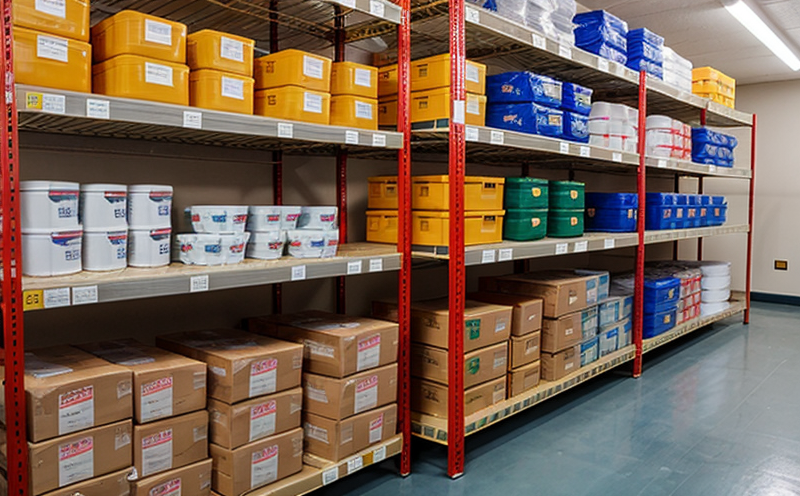Long Term Stability at 30C 75RH Testing
The long-term stability testing of pharmaceuticals under conditions of high humidity (75% Relative Humidity) and elevated temperature (30°C) is a critical step in the development, manufacturing, and quality assurance processes. This test simulates real-world storage conditions that may affect the shelf-life and efficacy of drug products.
The purpose of this test is to evaluate how well the active pharmaceutical ingredients (APIs), excipients, and overall formulation retain their chemical integrity over extended periods under accelerated environmental stressors. By accelerating these factors, stability testing can help predict potential degradation pathways, identify critical quality attributes, and determine shelf-life claims.
The 30°C/75% RH conditions are widely recognized as a standard for simulating extreme storage environments that might occur in tropical climates or during extended shipping durations. This method allows manufacturers to assess the robustness of their product formulations against environmental stressors before market release, ensuring compliance with regulatory requirements and maintaining patient safety.
During this testing process, samples undergo rigorous monitoring using high-precision instruments such as thermocouples, humidity sensors, and data loggers placed within the test chambers. Data collected includes temperature fluctuations, humidity levels, and other relevant parameters which are analyzed periodically throughout the study duration.
The acceptance criteria for successful completion of the 30°C/75% RH stability test vary depending on specific product characteristics but generally include:
- Preservation of chemical stability
- Maintenance of physical integrity
- Consistency in performance across batches
- Compliance with regulatory guidelines (e.g., FDA, EMA)
The results from this type of testing provide essential information for determining appropriate storage conditions and shelf-life claims. It also helps inform decisions regarding packaging materials and container systems that are capable of protecting the product during transportation and distribution.
It is important to note that while 30°C/75% RH tests are effective at identifying potential issues early in the development cycle, they do not necessarily reflect all possible environmental stresses a product might encounter throughout its lifecycle. Therefore, additional testing under different conditions may be necessary depending on the nature of the drug substance and its intended use.
In summary, long-term stability testing at 30°C/75% RH is an indispensable component of pharmaceutical quality assurance programs aimed at ensuring consistent product quality from batch to batch and maintaining regulatory compliance. Properly conducted tests provide valuable insights into potential risks associated with environmental factors and contribute significantly towards protecting public health.
Why It Matters
The importance of long-term stability testing cannot be overstated, especially when dealing with complex formulations like those found in modern pharmaceuticals. Ensuring that a drug product maintains its intended therapeutic effect over time is crucial for both patient safety and regulatory compliance.
One key reason why this test matters is the need to protect against degradation of active ingredients which could lead to reduced efficacy or even harmful side effects if not properly controlled. Another significant factor is the impact on overall supply chain management; understanding how a product behaves under accelerated conditions helps optimize storage practices and minimize waste due to expiration.
From an operational perspective, successful completion of these tests supports better decision-making regarding packaging options, labeling requirements, and ultimately contributes to more efficient inventory management. Furthermore, compliance with international standards such as ISO 11358 ensures that the results are accepted globally, facilitating smoother market entry processes.
In conclusion, investing in thorough long-term stability testing at 30°C/75% RH not only enhances product quality but also strengthens brand reputation and trust among consumers. By prioritizing this aspect of development early on, companies position themselves for sustained success in the competitive pharmaceutical industry.
Why Choose This Test
- Predictive Power: Accelerates aging process to forecast long-term stability.
- Comprehensive Evaluation: Assesses multiple aspects including chemical and physical properties.
- Regulatory Compliance: Meets stringent requirements set by FDA, EMA, and other global bodies.
- Data Richness: Provides extensive insights into potential degradation pathways.
- Patient Safety: Ensures that medicines remain effective and free from harmful contaminants over extended periods.
- Economic Benefits: Helps avoid costly recalls and product withdrawals by identifying issues early in the lifecycle.
- Sustainable Practices: Optimizes resource use through informed decisions about storage conditions and packaging solutions.
The comprehensive nature of 30°C/75% RH testing makes it an ideal choice for any organization committed to delivering high-quality pharmaceutical products. Its ability to provide robust data sets supporting regulatory submissions, coupled with its focus on patient safety and operational efficiency, positions this test as a cornerstone of modern quality assurance practices.
Quality and Reliability Assurance
At our laboratory, we employ state-of-the-art facilities equipped to perform long-term stability testing at 30°C/75% RH consistently and reliably. Our experienced team utilizes advanced analytical techniques including High Performance Liquid Chromatography (HPLC), Gas Chromatography Mass Spectrometry (GC-MS), and Infrared Spectroscopy (FTIR) to monitor sample integrity over extended periods.
To ensure accurate results, we adhere strictly to industry best practices outlined by organizations like the International Conference on Harmonization (ICH). This includes maintaining strict temperature and humidity controls within our test chambers using precision-controlled equipment. Additionally, real-time data logging ensures continuous monitoring of environmental conditions throughout the study duration.
Our commitment to quality extends beyond technical proficiency; we pride ourselves on providing personalized service tailored to each client's unique needs. From initial consultation through final report generation, our goal is to offer seamless support every step of the way.
- Data Integrity: Securely store and manage all test data electronically using HIPAA-compliant systems.
- Comprehensive Reporting: Deliver detailed reports summarizing findings along with recommendations for next steps.
- Custom Solutions: Offer flexible testing protocols to accommodate diverse product profiles.
In summary, our laboratory stands out by offering unparalleled accuracy and reliability in performing long-term stability tests at 30°C/75% RH. With a focus on maintaining the highest standards of scientific rigor combined with exceptional customer service, we are confident that you will find value in partnering with us for your quality assurance needs.





